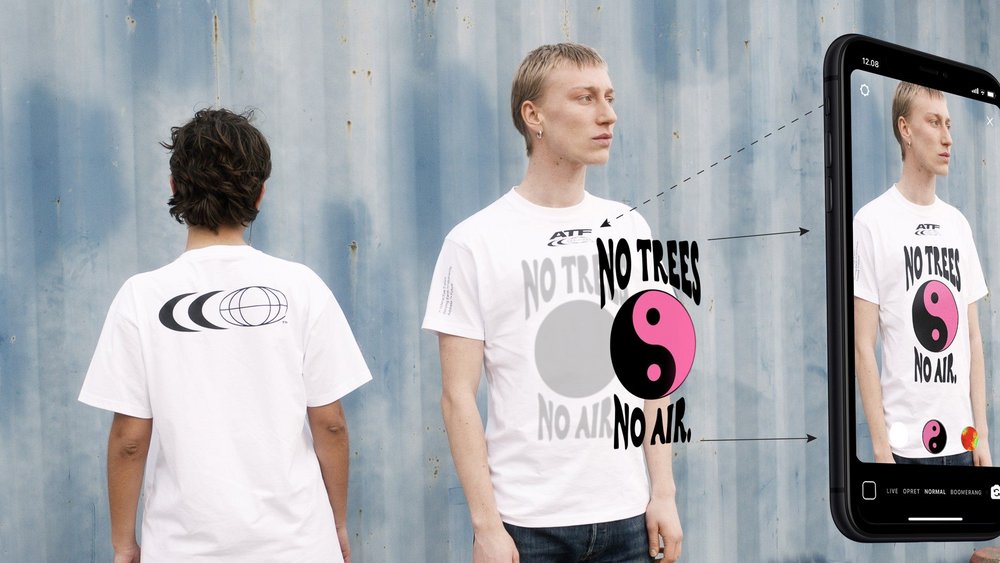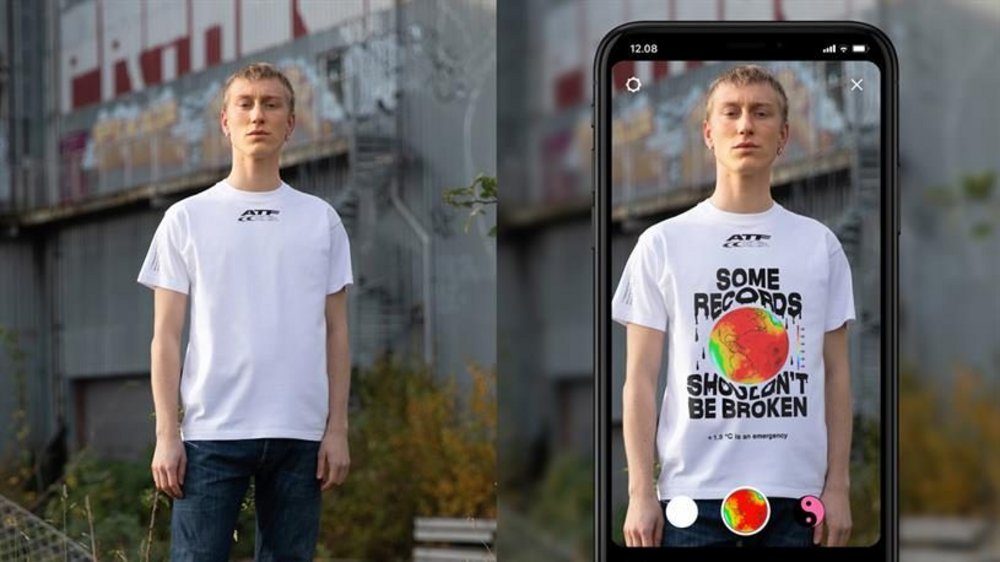Campaign of the Week
Carlings makes AR shirt for eco-and-style-conscious protest generation /
Norwegian fashion retailer creates augmented reality T-shirts in the name of sustainability
Scandinavian clothing brand Carlings has created an augmented reality T-shirt designed to reduce the environmental impact of fast fashion.
People can buy the T-shirt – which is white aside from a graphical logo at the top – from Carlings’ website for €39.90 ($44). The T-shirt is then mailed directly to the customer.

Upon delivery of the item, customers can visit Carlings’ dedicated Instagram account, select the filter icon and choose from a variety of designs, before pointing a phone camera at the T-shirt’s graphical logo. This will digitally superimpose the selected design onto the T-shirt.
The designs are emblazoned with environmentally conscious messages such as ‘Stop Denying Our Planet is Dying’ and ‘I’m Sure The Dinosaurs Thought They Had Time Too.’
New designs will regularly appear on the brand’s Instagram account ‘so every day the shirt can display new animated statement design to amplify your message’, according to Carlings’ website.
The project was created by Copenhagen-based Virtue Nordic, Vice Media's creative agency.

After unveiling The Last Statement initiative at our annual Most Contagious event in London on 6 December, Carlings made the T-shirts available for purchase on its website.
The brand says that 25% of each purchase will be donated to the charity WaterAid.
Contagious Insight /
Consumption crisis / Carlings’ augmented reality clothing gets right to the heart of the problem facing brands in the quest to balance commercial gain with being more sustainable. More and more people recognise that we need to consume less and waste less to protect our planet, but marketers and brands keep telling people to buy more stuff. This is the conundrum at the heart of the consumption crisis.
Your last T-shirt / The fashion industry is one of the most toxic industries in the world today, contributing heavily to water, air, and soil pollution. This problem has been getting worse with the rise of fast and disposable fashion fuelled by people constantly documenting their lives on social media. We now buy more than ever and throw away more than ever, too. In the US, people buy five times more clothing than they did in 1980, according to the Wall Street Journal. And, according to Barclaycard, almost one in ten UK shoppers admit to buying clothing only to take a photo on social media.
Carlings’ campaign addresses this problem by outfitting people with a T-shirt that can be redesigned an infinite number of times to share on social media, removing the waste associated with returning or disposing clothing items after a few wears. This activation follows a similar campaign that Carlings’ executed last year called ‘Neo-Ex’, a collection of digital clothing items that could be bought and worn on Instagram. This latest iteration shows Carlings’ investment in virtual and augmented reality clothing. While people might not be buying digital clothing en masse, it is becoming more commonplace. Earlier this year a digital dress designed by fashion house The Fabricant was sold for $9,500.
‘Digital fashion will become an important part of every fashion business' future business model,’ head of the Fashion Innovation Agency at the London College of Fashion, Matthew Drinkwater told the BBC. ‘It's not going to replace everything, but it will be an important part of that.’
Action required! / There is plenty of evidence to suggest that consumers expect brands to do something about the environmental crisis. YouGov recently found that a whopping 62% of Britons think climate change is the biggest threat to civilisation. Also, according to a report from J. Walter Thompson Intelligence, 92% of surveyed consumers said they are trying to live in a more sustainable way, while 83% would always pick the brand that has a better record of sustainability. Meanwhile, 90% of people surveyed agreed that companies/brands have a responsibility to take care of the planet and its people.
Carlings’ campaign shows that you can address the perils of fast fashion while being commercially minded at the same time.
This story originally appeared on Contagious I/O, our online intelligence tool. To find out more click here.
Want more of the same? /
We don’t just write about best-in-class campaigns, interviews and trends. Our Members also receive access to briefings, online training, webinars, live events and much more.






